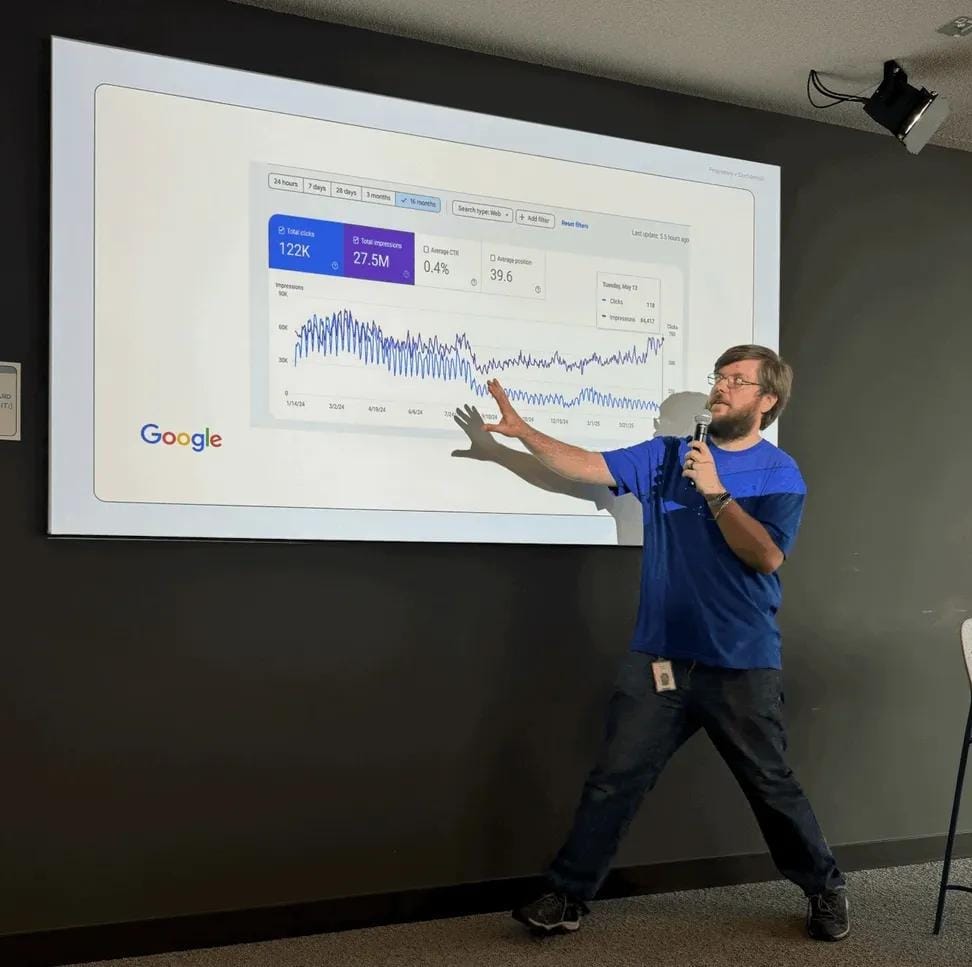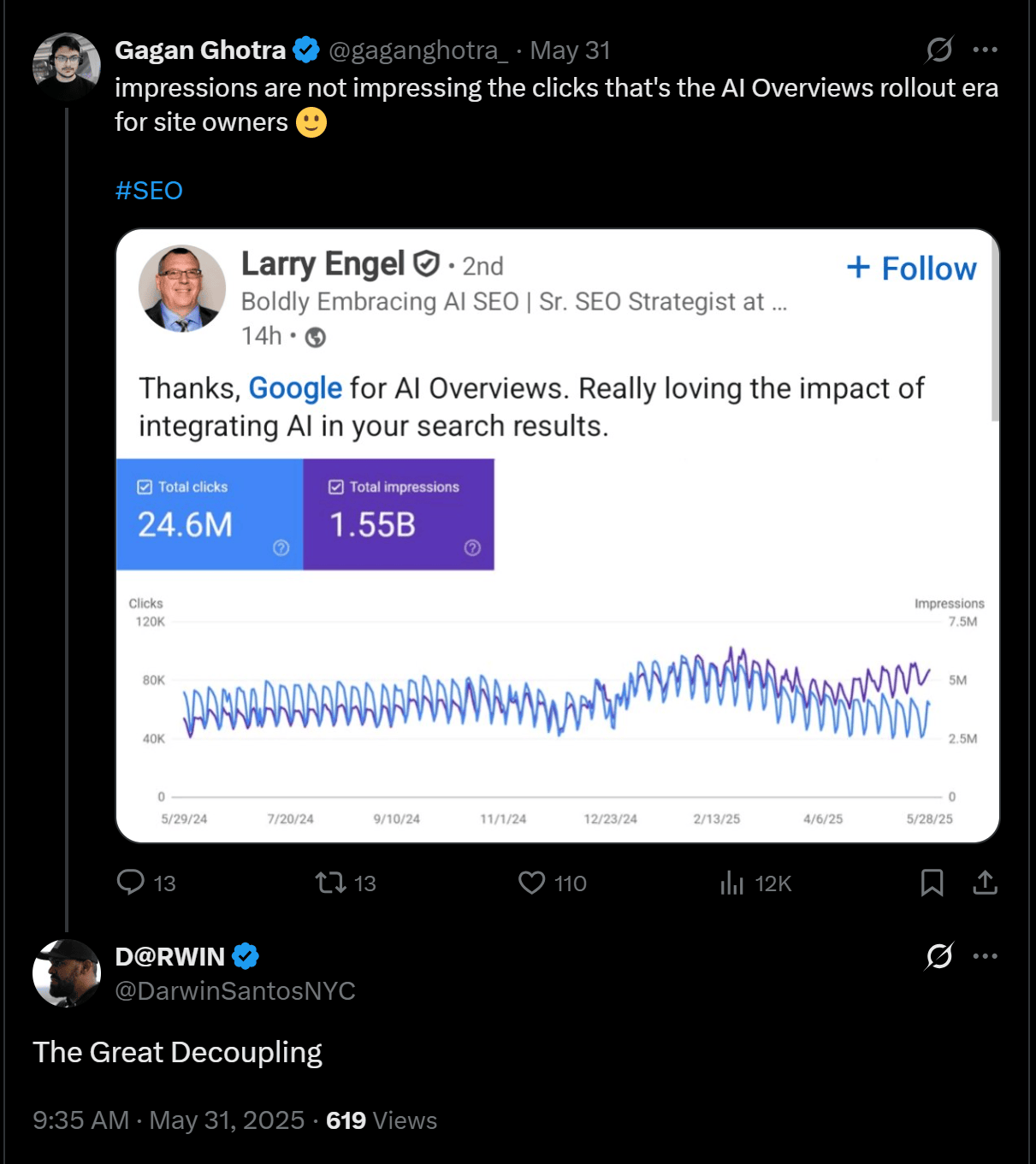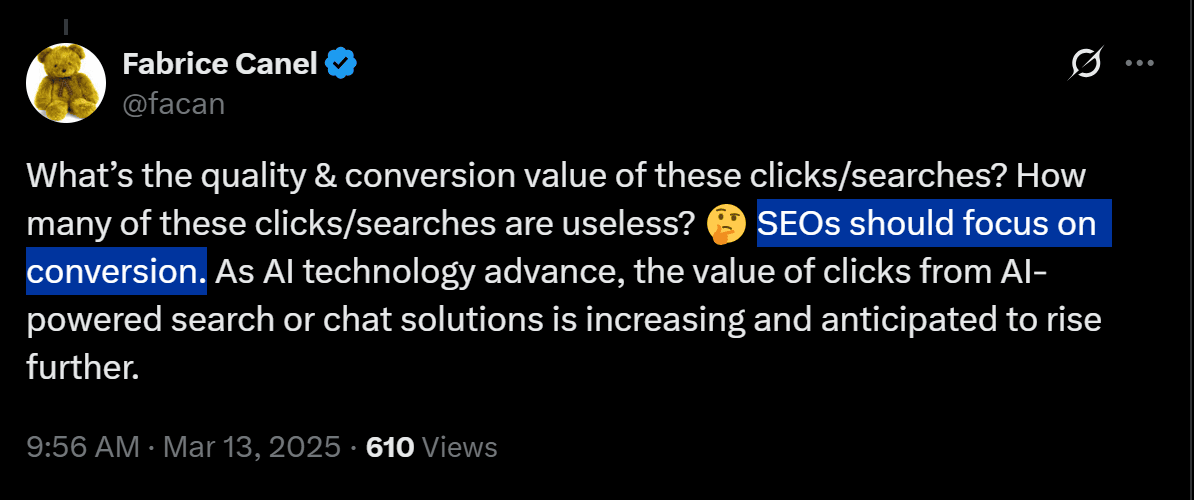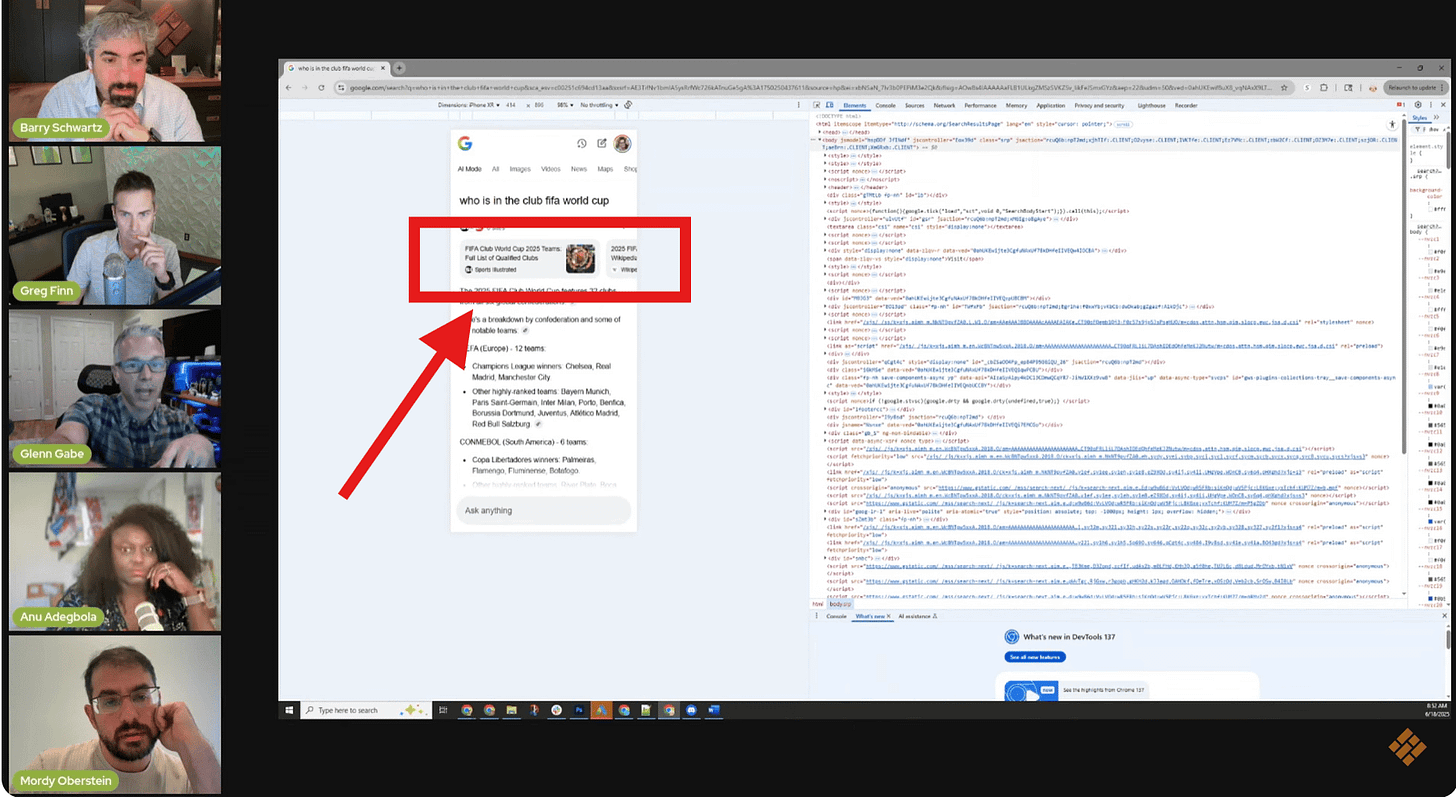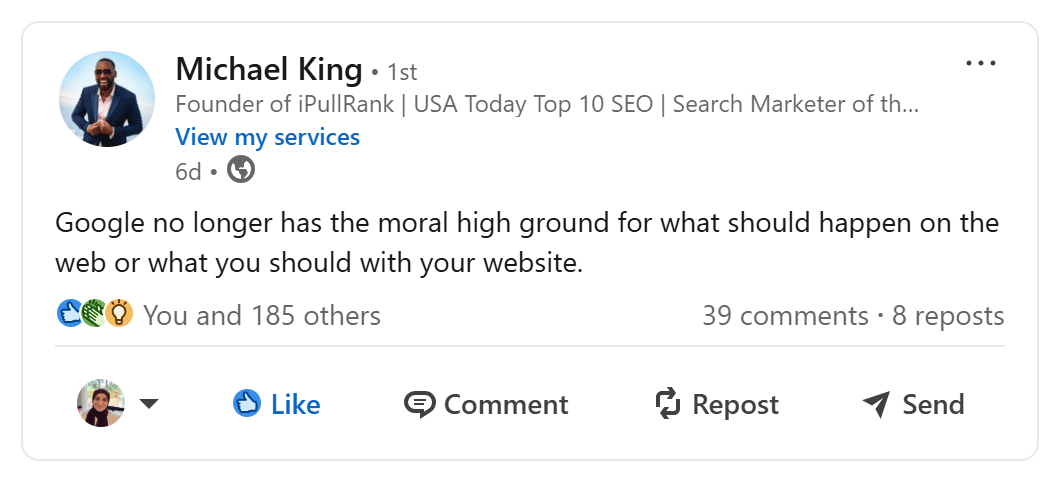Google Lunges and The Great Decoupling
I couldn’t help myself when I saw this photo of Google’s Martin Splitt passionately (and athletically lunging) in an attempt to explain how “if your impressions are up, clicks are down, you'll likely get more conversions" all thanks to AI Overviews.
I couldn’t tell if it was a Google lunge or just Martin living up to his name, doing mental and physical splits to help us understand this logic 😄
I have no intention of throwing shade at Martin. The man is simply trying to do his job. It’s just that there’s an Arabic saying that perfectly captures why I find this moment unintentionally funny:
"شرّ البليّة ما يُضحك"
The saying translates roughly to:
"The worst misfortunes are the ones that make you laugh."
It refers to situations that are so bad, absurd, or tragic that they become ironically or bitterly funny. And this is exactly how I feel about AI overviews, AI mode, and all Google's PR attempts to tell us this is somehow going to end well for us!
TL;DR
The great decoupling isn't great at all, it's very grime!
If you're a conversion-goal website like a SaaS or an Ecommerce brand, you may actually get more conversions from AI Overviews.
But if you're a small website with less authority in search, a new website or a publisher, there's no data that shows you can benefit from AIO.
In AI mode, you can be in position 1, but get no impressions. Ranking as a metric is becoming obsolete. We need to measure organic performance differently.
Rankings were never a measure of content quality anyways.
No AI system currently uses LLMs.txt
Ben Goodey shared an awesome SEO checklist for the new normal, check it out below!
Google no longer has the moral high ground for what should happen on the web or what you should with your website ~ Mike King.
The Great Decoupling
The great decoupling is a traffic pattern that was named by Darwin on twitter, where impressions increase (rejoice everyone!) while clicks decrease, due to AI Overviews appearing in SERPs.
The name is probably inspired by the great recession. So pun totally intended. Google has claimed on multiple occasions that AI Overview bring value to websites, here are just few:
Google's Elizabeth Reid says AI Overviews drive 'higher-quality clicks' ~ source
"The web is thriving" ~ Nick Fox, VP of Search at Google
"In fact, if you put content and links within AI Overviews, they get higher clickthrough rates than if you put it outside of AI Overviews." ~ Google CEO Sundar Pichai
"we’ll continue to focus on sending valuable traffic to publishers and creators.” ~ [source]
"With AI Overviews, people are visiting a greater diversity of websites for help with more complex questions. And we see that the links included in AI Overviews get more clicks than if the page had appeared as a traditional web listing for that query. " ~ Google
“If your content appears in AI Overviews, impressions will likely go up. Clicks might stagnate or fall. But this may improve conversions overall.” ~ Martin Splitt
To be fair, Bing does not get enough heat for following a similar approach in their search results 😄 [source]:
But study after study shows a decline in clicks. Let's not forget what happened to Chegg, the Mail Online (reported a 56% decrease in CTR for top-ranking keywords when AI Overviews appeared), and others... we have receipts!
On the other hand, we have other instances like this recent study from Ahrefs that asked the question "Does AI Search Traffic Convert Better Than Traditional Search?" and the answer was "For Ahrefs, Yes: 0.5% of Visitors Drove 12.1% of Signups"
In my last newsletter "Search is Chaos, But You Don't Have to Be :)" I mentioned that whether you will see an increase in conversions or not with AI Overviews depends on your website/business. But another study from Ahrefs gives us more insight into what type of websites would benefit more from the SGE.
The Ahrefs study shows that there's a correlation between the traffic a website gets, and getting cited in AIO, Chatgpt and Perplexity. This means that, websites that are already doing well in search, will do well in AIO as in being cited more. And while this may reduce clicks to those websites, it definitely will drive more conversions to them, since those websites have been recommended already to users by AIO.
So if you're a conversion-goal website like a SaaS or an Ecommerce brand, that's already established as a brand in search and getting a lot of traffic, you will probably get more conversions from AIO because you will probably get cited more.
However, if you're a new website, a small website with less authority, or a publisher, there is no evidence so far that your website will benefit from AIO.
💡 Unless your website offers some type of conversion action to the user, there's no data so far to suggest that you will benefit from AI Overviews in any way.
For now, we can assume the same impact from AI Mode, only amplified.
💡 Ten years ago, Google crawled two pages for every visitor it sent a publisher. Today the ratio is 18:1 and for ChatGPT the ratio is 1,500:1~ Axios
Rankings as a metric is obsolete
According to Google's head of Search, Liz Reid "This is the future of Google Search." referring to AI Mode.
Google finally announced that AI mode is now being tracked in GSC as part of the generic performance report, so if you're wondering how Google will rank pages in AI mode, I listened with interest to "It's New" episode with special guest Glen Gabe explaining how AI mode tracking happens.
It's super confusing and I came to the conclusion that rankings as a metric are becoming obsolete and useless. For example in mobile, you may get at the top a carousel that has many links. All of these links are going to be labeled as position 1. BUT, they will only get this ranking if they get an impression, meaning if the user doesn't scroll past the already visible carousel items, no impressions will be counted to the other links, and therefore no record of this in GSC.
The best comment I saw on this was "can't wait to explain this to clients" 😄
So technically you can be in position one, but because the user didn't scroll and give you an impression, you won't get that reported in GSC.
Why would we measure rankings if they mean nothing?
💡 We need to find the right metric to measure organic, as ranking isn't fit to measure organic performance in the future of search anymore.
And if you think about it, rankings didn't mean what we thought they were to begin with. AIO cites tons of websites that are not on the first page. Websites that got hammered by HCU, are cited in AIO. Rankings was never a measure of content quality anyways.... at least now we know this for sure.
On another note, if you're still pitching SEO as a way to "rank higher" in SERPs, think again. Businesses are after getting cited and recommended by different AI systems. Rankings just don't cut it anymore.
💡 "Businesses are scrambling to be cited in AI-generated answers on Google, Perplexity and ChatGPT." ~ Forbes
Learning in Beta
I think one of the problems we are collectively facing as a community is the lack of clarity of how we should adapt to the future of search. I mean there are few tests here and there, some studies, some theories as well. But no real guidance from Google.
We're jumping to conclusions at every turn, trying to adapt every new things, but also reject changes all at the same time! One recent tactic is LLMs.txt. We were flooded with so many posts about it, but then John Muller declared on Bluesky:
I don't have a tip for how we should approach new ideas tossed around other than "let's hold our horses and proceed with causation". Don't reject new tactics, but don't jump on every next trend too 🙃
A new checklist for the new SEO
In a recent newsletter I shared tips on how to write good content using ai. I think this gives you a solid foundation to leverage ai for content creation.
But if you're looking for a more comprehensive list of what you should be doing today in SEO, something more generic than just how to use ai for content creating, Ben Goodey shared an outstanding checklist on LinkedIn, and I think you should totally make a copy!
Audit Area Key Actions Notes
1. LLMs
Enter prompts around money keywords
Enter prompts around differentiators
Audit results and brand messaging
Reverse engineer sources used
Build roadmap for content & updates
Plan for tracking & periodic reviews
It's amazing what you find.
2. Reddit
Identify topically relevant threads & subreddits
Assess which are used by AI
Design community engagement plan
Avoid spamming; think long-term
Reddit is like ChatGPT’s best friend whispering product recos in its ear.
3. YouTube
Review money keywords on YouTube search
Optimize existing videos
Suggest new Shorts & video ideas
4. Social Profile Optimization
Pull up all social media profiles
Audit for SEO opportunities
Align brand messaging across platforms
5. App & Software Marketplaces
Audit listings in partner marketplaces (e.g. G2)
Optimize listings for search
Update outdated brand messaging
So many out-of-date ones!
6. Traditional SEO
Review MOFU/BOFU content
Identify content gaps
Evaluate messaging clarity
Create blog content roadmap
Low volume, high intent is GREAT.
LinkedIn search = real traffic driver.
The Moral High Ground
The best thing I read recently is this quote from Mike King:
Google is by far the biggest source of traffic on the web today, and yet the great decoupling is a reflection of how much Google does not care about publishers.
And That’s a Wrap (Almost 😄)
The great decoupling isn't great at all it's grime and while Google is Lunging to sell us on AI Overviews and AI mode, we can clearly see that while some websites may get more conversions, most - if not all - publishers will see no value.
In the era of the great decoupling, and the rising attention AI platforms is getting from businesses, measuring rankings as a north star metric does not make sense any more, the 10 blue links are gone ... almost!
The best thing you can do right now is learn and be open to learning new tactics. But approach with caution.
People are trying to figure this new reality out, and that's what's awesome about this community. SEO is not a solo player game, it's a team effort (thanks Ben for sharing your checklist).
In the meantime, till we figure ANYTHING out in this changing landscape, maybe we should all try some splits? maybe then we will have a better understanding of the value of the great decoupling 😄
Time to split! Bye and see you next newsletter!

